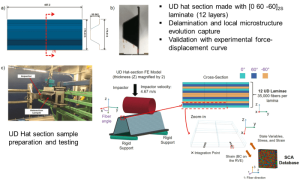
Step into the world of advanced materials in manufacturing, where cutting-edge technologies and innovative processes shape the future of production. Get ready for a journey filled with insights and discoveries that will redefine the way we look at materials and manufacturing.
From defining advanced materials to exploring their impact on various industries, this topic dives deep into the realm of modern manufacturing.
Introduction to Advanced Materials in Manufacturing
Advanced materials in manufacturing refer to materials that possess superior properties and characteristics compared to traditional materials like metals, plastics, and ceramics. These materials are engineered at the molecular level to exhibit specific qualities such as high strength, light weight, corrosion resistance, and thermal stability.Using advanced materials in modern manufacturing processes is crucial for staying competitive in the global market.
These materials enable manufacturers to produce innovative products with enhanced performance and durability. By utilizing advanced materials, companies can create products that are lighter, stronger, and more efficient than ever before.Advanced materials play a significant role in improving product performance and durability across various industries. For example, in the aerospace industry, advanced composites like carbon fiber reinforced polymers are used to construct lightweight yet strong aircraft components.
In the automotive sector, advanced alloys are employed to enhance fuel efficiency and safety features in vehicles. Overall, the integration of advanced materials in manufacturing processes leads to the development of cutting-edge products that meet the evolving demands of consumers.
Types of Advanced Materials Used in Manufacturing
Advanced materials play a crucial role in modern manufacturing processes, offering enhanced properties and performance compared to traditional materials. Common types of advanced materials used in manufacturing include composites, ceramics, and nanomaterials.
Composites
Composites are materials made from two or more constituent materials with significantly different physical or chemical properties. These materials are combined to create a new material with enhanced characteristics, such as increased strength, stiffness, and durability. Composites are commonly used in aerospace applications, automotive components, and sporting goods.
Ceramics
Ceramics are inorganic, non-metallic materials known for their high hardness, wear resistance, and thermal stability. They are used in manufacturing for applications requiring high temperature resistance, electrical insulation, and corrosion resistance. Ceramics are commonly found in cutting tools, electronic components, and thermal barrier coatings.
Nanomaterials
Nanomaterials are materials with structural features at the nanoscale, offering unique properties such as increased strength, flexibility, and chemical reactivity. They are used in various manufacturing applications, including electronics, healthcare, and energy storage. Nanomaterials can be found in products like nanocomposites, nanowires, and nanofluids.
Applications of Advanced Materials in Manufacturing
Advanced materials play a crucial role in various manufacturing industries, enhancing product performance and durability. Let’s explore how these materials are utilized in aerospace, automotive, and electronics manufacturing.
Aerospace Manufacturing
In aerospace manufacturing, advanced materials such as carbon fiber composites and titanium alloys are widely used. These materials offer high strength-to-weight ratios, corrosion resistance, and thermal stability, making them ideal for aircraft components. Carbon fiber composites are commonly used in the construction of fuselages, wings, and other structural parts, reducing overall weight and improving fuel efficiency. Titanium alloys are utilized in engine components due to their high strength and heat resistance, enhancing the performance and reliability of aircraft engines.
Automotive Manufacturing
Advanced materials have revolutionized the automotive industry, with the introduction of materials like high-strength steel, aluminum alloys, and carbon fiber composites. High-strength steel is used in vehicle frames and safety components, providing superior crash protection and structural rigidity. Aluminum alloys are employed in body panels and engine parts, reducing weight and improving fuel efficiency. Carbon fiber composites are utilized in high-performance vehicles for their lightweight and strength properties, enhancing speed and handling.
Electronics Manufacturing
In electronics manufacturing, advanced materials play a vital role in the production of semiconductors, circuit boards, and electronic components. Materials like silicon, gallium arsenide, and ceramic substrates are used for their electrical properties and thermal conductivity. Silicon is the most widely used semiconductor material in the production of microchips and integrated circuits, enabling high-speed processing and performance. Gallium arsenide is utilized in high-frequency applications due to its superior electron mobility, enhancing the efficiency of electronic devices.
Ceramic substrates are preferred for their thermal stability and insulating properties, ensuring reliable operation of electronic components.
Advancements in Advanced Materials Technology

Recent advancements in material science have paved the way for the development of new advanced materials, revolutionizing various industries. One key factor driving these advancements is the continuous research and innovation in the field of material science.
Impact of Additive Manufacturing Technologies
Additive manufacturing, also known as 3D printing, has significantly impacted the production of advanced materials. This technology allows for the precise and intricate fabrication of complex structures, leading to the creation of advanced materials with enhanced properties and functionalities.
- Utilization of additive manufacturing in aerospace industry for producing lightweight and strong components.
- Medical field using 3D printing to create customized implants and prosthetics with improved biocompatibility.
- Automotive sector incorporating additive manufacturing for rapid prototyping and production of parts with superior performance.
Future Trends in Advanced Materials Research and Manufacturing Processes
The future of advanced materials research and manufacturing processes looks promising, with several trends shaping the industry. These trends aim to enhance material properties, reduce production costs, and improve sustainability.
- Development of smart materials with self-healing and self-regulating capabilities for various applications.
- Exploration of nanomaterials and nanotechnology for creating materials with exceptional strength and conductivity.
- Integration of machine learning and AI in material design to accelerate the discovery of new advanced materials.
Industrial Goods and Services in the Advanced Materials Sector

Industrial goods and services play a crucial role in the advanced materials sector, driving innovation and efficiency in manufacturing processes.
Key Industrial Goods Produced Using Advanced Materials
- Advanced composite materials used in aerospace components for lightweight yet strong structures.
- Nanomaterials employed in electronics manufacturing for enhanced performance and miniaturization.
- High-performance alloys utilized in automotive parts to improve durability and fuel efficiency.
Services Offered in the Advanced Materials Industry
- Material testing and certification services ensure the quality and reliability of advanced materials used in manufacturing.
- Consulting services for selecting the right advanced materials based on specific application requirements.
- Research and development support to explore new materials and technologies for improved industrial goods production.
Impact of Advancements in Advanced Materials on Industrial Equipment and Machinery
- Advancements in advanced materials lead to the development of more efficient and durable industrial equipment, enhancing overall productivity.
- Lightweight materials can be used in machinery construction to reduce energy consumption and improve performance.
- Innovative materials with superior mechanical properties can prolong the lifespan of industrial equipment, reducing maintenance costs.
Last Word
As we conclude our exploration of advanced materials in manufacturing, it’s evident that these materials are revolutionizing the way we create products. With continuous advancements and new possibilities on the horizon, the future of manufacturing looks brighter than ever.
Answers to Common Questions
What are some examples of advanced materials used in manufacturing?
Common examples include composites, ceramics, and nanomaterials that offer unique properties for various applications.
How do advanced materials contribute to improving product performance?
Advanced materials enhance product durability, performance, and functionality due to their unique characteristics.
What recent advancements have impacted the development of advanced materials?
Recent advancements in material science and additive manufacturing technologies have played a significant role in creating new advanced materials.





